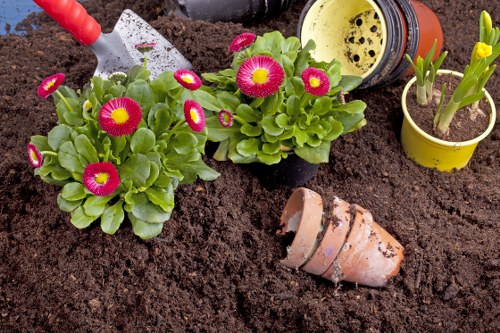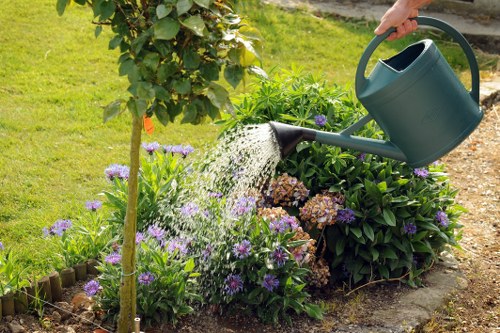Comprehensive Guide to Garden Maintenance in Gipsy Hill

Maintaining a beautiful garden in Gipsy Hill requires dedication, knowledge, and the right strategies tailored to the local climate and soil conditions. Whether you're a seasoned gardener or a novice, understanding the basics of garden upkeep can transform your outdoor space into a vibrant and inviting haven.
Gipsy Hill, known for its picturesque landscapes and diverse plant life, offers a unique environment for garden enthusiasts. The area's temperate climate and fertile soil provide an excellent foundation for a variety of plants, making it an ideal location for both ornamental and edible gardening.
In this article, we'll explore essential garden maintenance tips, seasonal tasks, and professional services available in Gipsy Hill to help you achieve a thriving and aesthetically pleasing garden.
Understanding the Local Climate and Soil

Successful garden maintenance begins with a deep understanding of Gipsy Hill's climate and soil composition. The area experiences a temperate climate with mild winters and warm summers, allowing for a wide range of plant species to flourish.
The soil in Gipsy Hill is predominantly loamy, rich in nutrients, and well-draining, which is ideal for most garden plants. However, it's essential to conduct a soil test to determine specific nutrient levels and pH balance, ensuring optimal conditions for your garden.
By tailoring your gardening practices to the local environment, you can enhance plant growth, reduce maintenance efforts, and minimize the risk of common gardening issues such as pests and diseases.
Essential Garden Maintenance Practices

Maintaining a garden involves various tasks that, when performed regularly, keep your outdoor space healthy and beautiful. Here are some essential maintenance practices for gardens in Gipsy Hill:
- Watering: Ensure your plants receive adequate water, especially during dry spells. Early morning watering reduces evaporation and helps prevent fungal diseases.
- Weeding: Regularly remove weeds to prevent them from competing with your garden plants for nutrients and water.
- Pruning: Trim overgrown branches and dead foliage to encourage healthy growth and improve plant shape.
- Mulching: Apply mulch around plants to retain moisture, regulate soil temperature, and suppress weed growth.
- Fertilizing: Use appropriate fertilizers to provide essential nutrients and promote vigorous plant development.
Seasonal Garden Care in Gipsy Hill

Different seasons bring unique challenges and opportunities for garden maintenance. Adapting your care routine to the changing seasons ensures year-round garden health.
Spring Maintenance
Spring is the perfect time to prepare your garden for the growing season. Begin by clearing away any debris from the winter months and inspecting plants for signs of damage or disease.
- Planting: Introduce new plants and perennials to diversify your garden.
- Soil Preparation: Add compost or organic matter to enrich the soil.
- Pruning: Trim back shrubs and trees to encourage new growth.
Summer Maintenance
Summer maintenance focuses on keeping plants healthy and managing growth during the warmer months.
- Watering: Increase watering frequency to cope with higher temperatures.
- Pest Control: Monitor for pests and apply natural or chemical controls as needed.
- Deadheading: Remove spent flowers to promote continuous blooming.
Choosing the Right Plants for Gipsy Hill Gardens

Selecting plants that thrive in Gipsy Hill's environment is crucial for a successful garden. Consider the following factors when choosing your plants:
- Sunlight: Assess the sunlight patterns in your garden to select plants that match the available light, whether full sun, partial shade, or full shade.
- Soil Type: Choose plants that are well-suited to your garden's soil conditions, ensuring they receive the necessary nutrients and drainage.
- Water Requirements: Opt for drought-tolerant varieties or those that require consistent moisture, depending on your watering capabilities.
- Climate Adaptability: Select plants that can withstand Gipsy Hill's temperature range and seasonal variations.
Popular choices for Gipsy Hill gardens include roses, lavender, hydrangeas, and various shrubs that offer vibrant colors and robust growth.
Professional Garden Maintenance Services in Gipsy Hill
For those who prefer expert assistance, numerous professional garden maintenance services are available in Gipsy Hill. These services offer comprehensive care, ensuring your garden remains pristine throughout the year.
Services Offered
- Lawn Care: Mowing, aeration, and fertilization to maintain a healthy and lush lawn.
- Planting and Landscaping: Designing and installing plant beds, trees, and ornamental features.
- Seasonal Clean-Ups: Removing fallen leaves, pruning plants, and preparing the garden for seasonal changes.
- Irrigation Systems: Installing and maintaining automated watering systems for efficient water usage.
Choosing the Right Service Provider
When selecting a garden maintenance service in Gipsy Hill, consider the following factors:
- Experience: Look for providers with a proven track record and expertise in local garden care.
- Range of Services: Ensure the company offers the specific services you require.
- Reputation: Check reviews and testimonials to gauge customer satisfaction.
- Pricing: Compare quotes to find a service that fits your budget without compromising quality.
Engaging with professionals can save you time and ensure your garden receives the attention it deserves.
Eco-Friendly Garden Practices
Adopting eco-friendly garden maintenance practices not only benefits the environment but also promotes a healthier garden ecosystem. Here are some sustainable practices to consider:
- Composting: Recycle garden waste into nutrient-rich compost to improve soil health.
- Rainwater Harvesting: Collect and utilize rainwater for irrigation, reducing reliance on tap water.
- Natural Pest Control: Use organic methods and beneficial insects to manage pests without harmful chemicals.
- Native Plants: Incorporate native species that are well-adapted to the local environment and require less maintenance.
- Mulching: Apply organic mulch to conserve moisture, regulate soil temperature, and suppress weeds.
Implementing these practices contributes to a sustainable garden that thrives in harmony with nature.
Tools and Equipment for Efficient Garden Maintenance
Having the right tools and equipment is essential for effective garden maintenance. Investing in quality tools can make tasks easier and more enjoyable.
- Pruners and Shears: For precise trimming and shaping of plants.
- Lawn Mower: To maintain a neat and even lawn.
- Garden Fork: For aerating soil and removing weeds.
- Watering Equipment: From hoses to watering cans, ensuring efficient irrigation.
- Gloves and Protective Gear: To protect your hands and body while working in the garden.
- Wheelbarrow: For transporting soil, plants, and other materials.
Regular maintenance of your tools ensures longevity and optimal performance, making your gardening experience more efficient.
Dealing with Common Garden Challenges
Every garden faces its own set of challenges, from pests to plant diseases. Knowing how to address these issues is key to maintaining a healthy garden.
Pest Management
Pests can cause significant damage to your garden if not managed properly. Implementing integrated pest management (IPM) strategies can help control pest populations while minimizing harm to beneficial insects and the environment.
- Monitoring: Regularly inspect plants for signs of pests.
- Biological Controls: Introduce natural predators like ladybugs and butterflies.
- Cultural Practices: Maintain plant health through proper watering and fertilization to resist pest infestations.
- Organic Pesticides: Use environmentally friendly pesticides as a last resort.
Managing Plant Diseases
Plant diseases can spread quickly and devastate a garden. Preventative measures and early intervention are crucial:
- Sanitation: Remove and dispose of infected plant material promptly.
- Proper Spacing: Ensure adequate airflow between plants to reduce humidity and disease risk.
- Resistant Varieties: Choose plant varieties that are resistant to common diseases in Gipsy Hill.
- Fungicides: Apply appropriate fungicides when necessary, following guidelines to minimize environmental impact.
Maintaining vigilant care and adopting preventive measures can keep your garden resilient against diseases.
Enhancing Your Garden with Decorative Elements
Beyond plant care, adding decorative elements can elevate the beauty and functionality of your garden. Consider incorporating the following features:
- Pathways: Create inviting paths using materials like gravel, stone, or wood to navigate your garden.
- Water Features: Incorporate fountains, ponds, or birdbaths to add a soothing ambiance.
- Garden Lighting: Use outdoor lighting to highlight key areas and extend garden enjoyment into the evening.
- Seating Areas: Designate spaces with benches or chairs for relaxation and enjoyment.
- Ornamental Structures: Add trellises, pergolas, or garden sculptures for visual interest.
These elements not only enhance the aesthetic appeal but also increase the usability and enjoyment of your garden space.
Organic Gardening Practices
Embracing organic gardening practices promotes a healthier ecosystem and reduces the reliance on synthetic chemicals. Here are some key organic practices:
- Composting: Transform kitchen and garden waste into nutrient-rich compost to naturally fertilize your plants.
- Natural Pest Control: Utilize organic remedies and encourage beneficial insects to manage pests.
- Crop Rotation: Rotate plant families each season to prevent soil depletion and reduce disease buildup.
- Organic Mulch: Use materials like straw, leaves, or wood chips to mulch, enhancing soil health.
- Heirloom Varieties: Plant heirloom species that are often more resilient and flavorful.
Adopting these practices results in a sustainable garden that supports biodiversity and fosters natural plant growth.
Maximizing Space in Small Gardens
Even with limited space, you can create a thriving garden in Gipsy Hill by implementing space-saving strategies:
- Vertical Gardening: Utilize wall space and trellises to grow climbing plants and maximize vertical space.
- Container Gardening: Grow herbs, flowers, and vegetables in pots and containers, making it easier to manage and rearrange plants.
- Raised Beds: Install raised garden beds to increase planting areas and improve soil conditions.
- Compact Plant Varieties: Choose dwarf or compact plant species that require less space.
- Smart Layout: Plan your garden layout to ensure efficient use of available space, allowing for easy access and maintenance.
With thoughtful planning and innovative solutions, small gardens can be both functional and beautiful.
Maintaining Garden Tools and Equipment
Proper maintenance of your gardening tools and equipment ensures their longevity and effectiveness. Follow these tips to keep your tools in top condition:
- Cleaning: After each use, clean tools to remove dirt and debris that can cause rust and damage.
- Sharpening: Regularly sharpen blades and cutting edges to maintain their performance.
- Storage: Store tools in a dry, sheltered area to prevent rust and deterioration.
- Lubrication: Apply oil to metal parts to reduce friction and prevent rusting.
- Inspection: Periodically check tools for signs of wear or damage, repairing or replacing parts as necessary.
Taking care of your tools not only extends their lifespan but also makes your gardening tasks more efficient and enjoyable.
Creating a Garden Maintenance Schedule
Establishing a maintenance schedule helps you stay organized and ensures that all necessary tasks are completed in a timely manner. Here's how to create an effective schedule:
- Assess Your Garden: Identify the specific needs of your garden, including plant types and existing features.
- List Tasks: Enumerate all maintenance tasks required, such as watering, weeding, pruning, and fertilizing.
- Assign Frequency: Determine how often each task needs to be performed, adjusting for seasonal changes.
- Set Reminders: Use calendars or digital tools to set reminders for upcoming maintenance activities.
- Review and Adjust: Regularly evaluate your schedule's effectiveness and make adjustments based on your garden's evolving needs.
A well-structured maintenance schedule keeps your garden in optimal condition and reduces the risk of overlooking essential tasks.
Benefits of Regular Garden Maintenance
Consistent garden maintenance offers numerous advantages, enhancing both the aesthetics and functionality of your outdoor space:
- Healthier Plants: Regular care promotes robust growth and resilience against pests and diseases.
- Enhanced Curb Appeal: A well-maintained garden boosts the overall appearance of your home or property.
- Increased Property Value: Beautiful landscaping can significantly enhance your property's market value.
- Personal Enjoyment: Spending time in a thriving garden can provide relaxation and a sense of accomplishment.
- Environmental Impact: A healthy garden supports local biodiversity and contributes to a greener environment.
Investing time and effort into garden maintenance yields long-term rewards, both tangible and intangible.
Innovative Garden Technologies
Integrating modern technologies into your garden maintenance routine can streamline tasks and enhance efficiency. Consider the following innovations:
- Smart Irrigation Systems: Automated watering systems that adjust based on weather conditions and soil moisture levels.
- Garden Sensors: Devices that monitor soil health, temperature, and humidity, providing real-time data for optimal plant care.
- Robotic Lawn Mowers: Autonomous mowers that maintain your lawn with minimal intervention.
- Mobile Apps: Applications that offer gardening tips, maintenance reminders, and plant identification features.
- Solar Lighting: Eco-friendly lighting solutions powered by solar energy to illuminate your garden sustainably.
Embracing these technologies can make garden maintenance more convenient and effective, allowing you to enjoy your garden with less effort.
Community Resources and Support
Gipsy Hill offers a variety of community resources and support networks for garden enthusiasts. Engaging with these resources can provide valuable knowledge and foster a sense of community:
- Local Gardening Clubs: Join groups focused on sharing gardening tips, organizing events, and participating in community projects.
- Workshops and Classes: Attend educational sessions offered by local garden centers or community organizations.
- Community Gardens: Participate in shared gardening spaces, allowing you to collaborate and learn from fellow gardeners.
- Online Forums: Engage with online communities specific to Gipsy Hill garden maintenance for advice and support.
- Local Nurseries: Visit local nurseries for expert advice, plant selection, and gardening supplies.
Leveraging these resources enhances your gardening knowledge and connects you with like-minded individuals.
Conclusion: Achieving a Flourishing Garden in Gipsy Hill
Maintaining a garden in Gipsy Hill is a rewarding endeavor that combines aesthetic beauty with environmental stewardship. By understanding the local climate, following essential maintenance practices, and utilizing available resources, you can cultivate a thriving garden that brings joy and tranquility.
Whether you choose to undertake garden maintenance yourself or enlist professional services, the key to success lies in consistent care and a passion for nurturing your outdoor space.
Ready to transform your garden into a stunning oasis? Contact us today to explore professional garden maintenance services tailored to your needs in Gipsy Hill.
